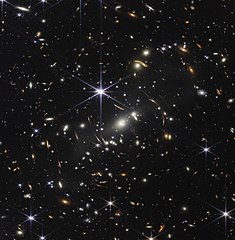“Chances are, what we see, we will not understand… The very definition of wonder.”
That quote comes from an episode of 60 Minutes broadcast after the launch of the James Webb Space Telescope. The telescope is designed to be able to look so far into the distance that it will look back in time over 13 billion years, back to the edge of what is knowable.
It took years of construction and testing. It took weeks to travel from Earth to a point known as L2, where the gravity of the Earth and the Sun together allow it to orbit the Sun far from the heat emitted by the Earth and yet keep pace with the Earth. Months of delicate unfolding, cooling and testing are finally at an end and the first serious images have been taken. Someday soon we will start to see things we don’t understand.

The goal of all research is to see something new, even when that something is very, very old. The greatest thrill a scientist, or any researcher, can know is to see something they do not understand, something new even if it is very old. Something that makes them feel that wonder. With skill and thought and perhaps a bit of luck, the next thrill, the one that follows the thrill of wonder, is the thrill of understanding.
Not long ago, I traced a client’s ancestry back to Magna Carta, to a man who was in England “T.R.E.” , that is, in the time of King Edward the Confessor. Edward died in 1066, nearly one thousand years ago. Every English monarch from William the Conqueror onward can trace their descent back to the emperor Charlemagne (died 814). So anyone who can prove they descend from English royalty has, in effect, proven their descent from the earliest known ancestors of Charlemagne. If, on the other hand, one only descends from the aristocracy, getting back to someone listed in Magna Carta as already living in England before the Conquest is the genealogical equivalent of an astronomer seeing back to the edge.
Genealogy may not be on par with cutting edge astronomy. We will not peer back to when newborn galaxies fade into the darkness and strain to see just a bit farther, but we can trace back to when our ancestors fade into a wilderness or get lost in a teaming metropolis and strain to see just a bit father. With luck we will find things that we do not understand and have the thrill and privilege of wonder and later know the thrill of understanding.